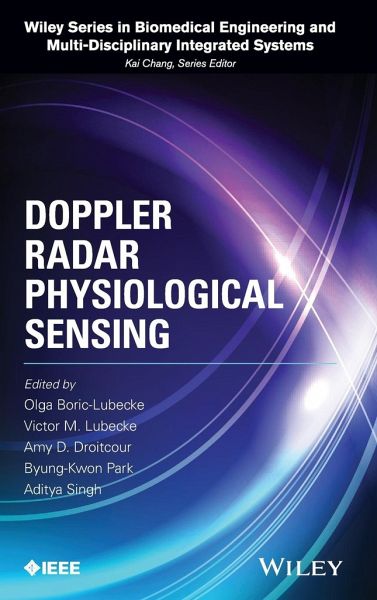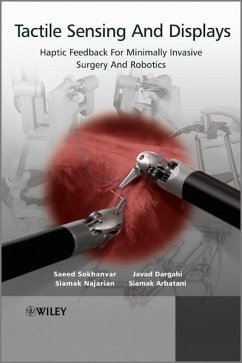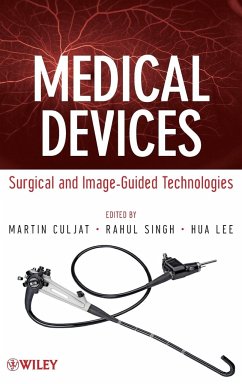
Doppler Radar Physiological Sensing
Versandkostenfrei!
Versandfertig in über 4 Wochen
140,99 €
inkl. MwSt.
Weitere Ausgaben:

PAYBACK Punkte
70 °P sammeln!
Doppler radar physiological monitoring field has been growing in research and development, and as products go to market, there is an increased need for a reference text in this area. There is no reference book on this topic published to date. This book's editors have extensive experience in the field and have co-founded a start-up company that is currently commercializing this technology for respiratory rate spot check and monitoring.
Key features:
* Edited by the preeminent team of experts in doppler radar who have over 40 years of combined experience with this technology
* Provides overview of basics of physiological monitoring
* Addresses current research and commercial development of Doppler radar based physiological monitoring applications, including healthcare applications and military applications.
Key features:
* Edited by the preeminent team of experts in doppler radar who have over 40 years of combined experience with this technology
* Provides overview of basics of physiological monitoring
* Addresses current research and commercial development of Doppler radar based physiological monitoring applications, including healthcare applications and military applications.
Presents a comprehensive description of the theory and practical implementation of Doppler radar-based physiological monitoring
This book includes an overview of current physiological monitoring techniques and explains the fundamental technology used in remote non-contact monitoring methods. Basic radio wave propagation and radar principles are introduced along with the fundamentals of physiological motion and measurement. Specific design and implementation considerations for physiological monitoring radar systems are then discussed in detail. The authors address current research and commercial development of Doppler radar based physiological monitoring for healthcare and other applications.
Explains pros and cons of different Doppler radar architectures, including CW, FMCW, and pulsed Doppler radar
Discusses nonlinear demodulation methods, explaining dc offset, dc information, center tracking, and demodulation enabled by dc cancellation
Reviews advanced system architectures that address issues of dc offset, spectrum folding, motion interference, and range resolution
Covers Doppler radar physiological measurements demonstrated to date, from basic cardiopulmonary rate extractions to more involved volume assessments
Doppler Radar Physiological Sensing serves as a fundamental reference for radar, biomedical, and microwave engineers as well as healthcare professionals interested in remote physiological monitoring methods.
Olga Boric-Lubecke, PhD, is a Professor of Electrical Engineering at the University of Hawaii at Manoa, and an IEEE Fellow. She is widely recognized as a pioneer and leader in microwave radar technologies for non-contact cardiopulmonary monitoring, and in the design of integrated circuits for biomedical applications.
Victor M. Lubecke, PhD, is a Professor of Electrical Engineering at the University of Hawaii at Manoa. He is an emeritus IEEE Distinguished Microwave Lecturer and has over 25 years of experience in research and development of devices and methods for radio-based remote sensing systems.
Amy Droitcour, PhD, has spent ten years developing radar-based vital signs measurement technology through her dissertation research and leading product development as CTO of Kai Medical. She currently serves as Senior Vice President of R&D at Wave 80 Biosciences.
Byung-Kwon-Park, PhD, is a senior research engineer at the Mechatronics R&D Center in Korea.
Aditya Singh, PhD, is currently a postdoctoral researcher at the University of Hawaii Neuroscience and MRI research Program.
This book includes an overview of current physiological monitoring techniques and explains the fundamental technology used in remote non-contact monitoring methods. Basic radio wave propagation and radar principles are introduced along with the fundamentals of physiological motion and measurement. Specific design and implementation considerations for physiological monitoring radar systems are then discussed in detail. The authors address current research and commercial development of Doppler radar based physiological monitoring for healthcare and other applications.
Explains pros and cons of different Doppler radar architectures, including CW, FMCW, and pulsed Doppler radar
Discusses nonlinear demodulation methods, explaining dc offset, dc information, center tracking, and demodulation enabled by dc cancellation
Reviews advanced system architectures that address issues of dc offset, spectrum folding, motion interference, and range resolution
Covers Doppler radar physiological measurements demonstrated to date, from basic cardiopulmonary rate extractions to more involved volume assessments
Doppler Radar Physiological Sensing serves as a fundamental reference for radar, biomedical, and microwave engineers as well as healthcare professionals interested in remote physiological monitoring methods.
Olga Boric-Lubecke, PhD, is a Professor of Electrical Engineering at the University of Hawaii at Manoa, and an IEEE Fellow. She is widely recognized as a pioneer and leader in microwave radar technologies for non-contact cardiopulmonary monitoring, and in the design of integrated circuits for biomedical applications.
Victor M. Lubecke, PhD, is a Professor of Electrical Engineering at the University of Hawaii at Manoa. He is an emeritus IEEE Distinguished Microwave Lecturer and has over 25 years of experience in research and development of devices and methods for radio-based remote sensing systems.
Amy Droitcour, PhD, has spent ten years developing radar-based vital signs measurement technology through her dissertation research and leading product development as CTO of Kai Medical. She currently serves as Senior Vice President of R&D at Wave 80 Biosciences.
Byung-Kwon-Park, PhD, is a senior research engineer at the Mechatronics R&D Center in Korea.
Aditya Singh, PhD, is currently a postdoctoral researcher at the University of Hawaii Neuroscience and MRI research Program.













